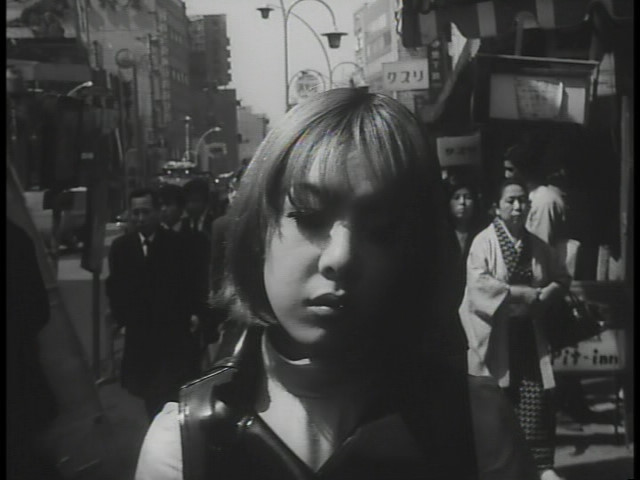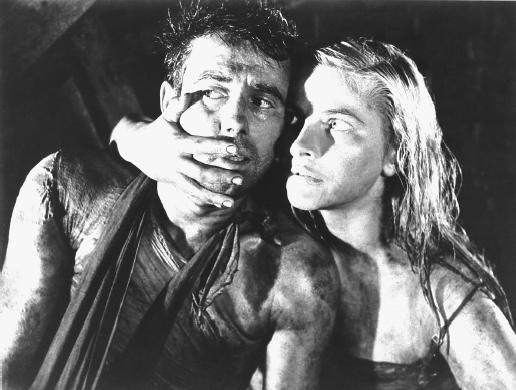 Godard's sixth feature was very much a departure for him. He previously made low budget films on the run. With international producers Joseph Levine and Carlo Ponti on board, Godard was able to utilise much larger budgets than he was used to in order to create a defining film about cinema, but so much more. As is always the case with Godard, there is far more going on than meets the eye. On one level, it's a film about the balance between art and commerce, whilst on another level, it's a film about a marriage breaking down. It might ultimately be read as Godard's own marriage breaking down or perhaps a film that very much is about itself - where the difficulties depicted onscreen reflected very much the difficulties that the film ran into whilst in production.
Godard's sixth feature was very much a departure for him. He previously made low budget films on the run. With international producers Joseph Levine and Carlo Ponti on board, Godard was able to utilise much larger budgets than he was used to in order to create a defining film about cinema, but so much more. As is always the case with Godard, there is far more going on than meets the eye. On one level, it's a film about the balance between art and commerce, whilst on another level, it's a film about a marriage breaking down. It might ultimately be read as Godard's own marriage breaking down or perhaps a film that very much is about itself - where the difficulties depicted onscreen reflected very much the difficulties that the film ran into whilst in production.The opening scene of 'Le Mépris' reflects the arguments Godard had with his producers. Having finally cast Brigitte Bardot in one of the leads, the director and producers had different ideas about how she should be used. Ponti and Levine insisted on featuring Bardot nude - a demand Godard finally acceded to, but what he actually gave them was a distinctly unerotic image of a nude Bardot. Lying on the bed front down, Camille asks her husband Paul (Michel Piccoli) about her body; what he likes about it and so on. So nudity is discussed rather than shown, and what's more, it's a scene more about insecurity rather than a celebration of Bardot's figure. The scene completely subverts her public persona as the sex kitten of 'And God Created Woman' and other films. So the arguments within 'Le Mépris' between the producer Prokosch (Jack Palance) and Fritz Lang (himself) might reflect those between the producers and Godard himself. When Prokosch tells Lang "you've cheated me", should we interpret this as the general feeling about the actual film itself?
The narrative mainly focuses on an adaptation of Homer's 'Odyssey' at the Cinecitta studios in Rome, with Lang as the film's director who wants to make a faithful version of the poem, and Prokosch a crass American producer who wants more semi-nude mermaids to make the film more commercially appealing. Prokosch hires Paul, a playwright who worked on such terrific films as 'Toto versus Hercules' (which refers to Levine's producing past), to rework the script to his liking. Whilst deliberating over whether to accept the commission, Paul finds himself increasingly estranged from Camille, who has caught the eye of Prokosch and who makes his intentions pretty clear. It's a marital breakdown that is never really explained. Their arguments are evasive, and whilst it's hinted that Paul has been violent in the past, this never seems the likely explanation. Perhaps it's Paul's lack of integrity - the way in which he compromised his principles and the way he complies with Prokosch's wishes to see Camille which more or less encourages her infidelity.
This love triangle echoes that of the film they are making, with Paul as Odysseus, Camille as Penelope and Prokosch as Posideon. During moments of estrangement or argument between the couple, there are cuts to the statues of the Roman Gods, which reiterates this idea. Another interpretation is that of Paul as Godard and Camille as Anna Karina, which is emphasised by the instances of Camille wearing a black wig like Karina. The richness of Godard's films is that they're seldom as simple as they appear, offering a multitude of insights or understandings. The cinematic references also underpin the themes, with the likes of 'Voyage in Italy' also focusing on a marital breakdown. Filmed in Technicolour by Raoul Coutard and featuring a breathtaking score by George Delerue, two of Godard's most able collaborators across his career, 'Le Mépris' is one of Godard's finest; a masterpiece for certain, with only 'Pierrot Le Fou' matching it, in my opinion. 5/5









